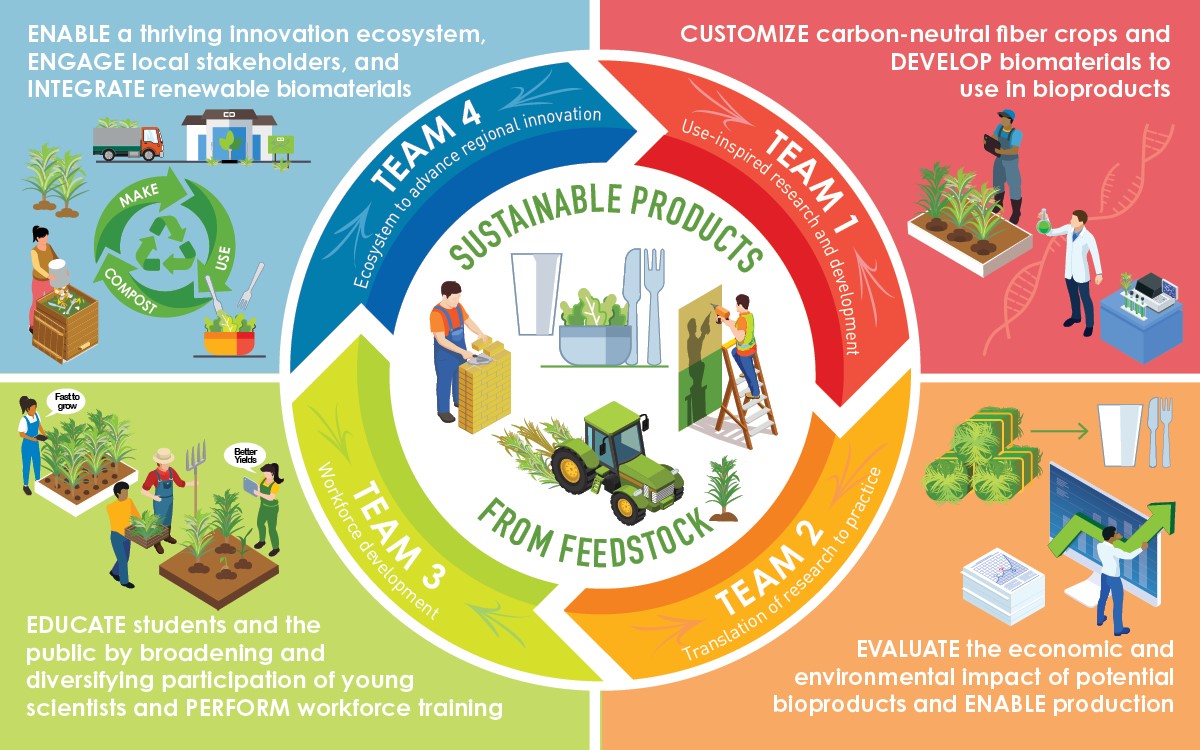Maria Soledad Peresin, associate professor in the Auburn University College of Forestry, Wildlife and Environment, or CFWE, is one of the researchers leading a team recently awarded $1 million from the U.S. National Science Foundation’s Regional Innovation Engines, or NSF Engines, program.
The funded project, titled “Advancing carbon-neutral crop technologies to develop sustainable consumer goods (AL, GA, NC, TN),” or ‘Greening the Southeast’ for short, aims to develop a green, circular bioeconomy for building materials and consumer goods in the Southeast that reduces climate change impacts from manufacturing by eliminating industry reliance on petroleum and environmentally costly fibers. With a sweeping mission and scope, the project could benefit industry, scientists, farmers, and consumers in the Southeast.
Led by Jeremy Schmutz of HudsonAlpha Institute for Biotechnology, the team of experts across multiple disciplines and institutions is among the more than 40 unique teams to receive one of the first-ever NSF Engines Development Awards, which aim to help partners collaborate to create economic, societal and technological opportunities for their regions.
“The engine’s focus across the entire product development life cycle and the engagement of a diverse group of stakeholders will benefit those at each discovery stage, build incentives and drive innovation forward,” said Peresin. “These gains will include job opportunities and training for diverse scientists from minority-serving institutions and rural communities in plant genetics and genomics, plant gene editing and perennial agronomy.”
The NSF Engines program is a transformational investment for the nation, ensuring the U.S. remains competitive for decades to come.
“These NSF Engines Development Awards lay the foundation for emerging hubs of innovation and potential future NSF Engines,” said NSF Director Sethuraman Panchanathan. “These awardees are part of the fabric of NSF’s vision to create opportunities everywhere and enable innovation anywhere. They will build robust regional partnerships rooted in scientific and technological innovation in every part of our nation. Through these planning awards, NSF is seeding the future for in-place innovation in communities and to grow their regional economies through research and partnerships. This will unleash ideas, talent, pathways and resources to create vibrant innovation ecosystems all across our nation.”
Peresin is joined by other Auburn University faculty and staff in developing the project. Michelle Cole, head of the Auburn chapter of the National Society for Minorities in Agriculture, Natural Resources and Related Sciences, or MANRRS, will work with Co-PI Kankshita Swaminathan of HudsonAlpha on the workforce development arm with an emphasis on diversity, equity and inclusion.
As part of the planning process, Kelly Dunning, associate professor of conservation governance in the CFWE, will support the group by developing an evaluation plan for both the research, development and training components. Assistant Professor and Alabama Extension Specialist Leanne Dillard will be responsible for assisting with extension activities pertaining to the development of a data-driven plan for meeting the education and training needs of the ENGINE stakeholders in a scalable and coordinated way, with an emphasis on diversity, equity and inclusion as a guiding principle.
“The southern region has significant resources in farmable marginal land, research in plant genomics — many groups focusing on sustainable biomaterials — and significant untapped resources for new scientists across many HBCUs,” said Peresin. “With an integrated region accelerator to act as a hub for research, training and innovation, we can catalyze the major change needed in manufacturing to achieve carbon neutrality.”
The awardees span a broad range of states and regions, reaching geographic areas that have not fully benefited from the technology boom of the past decades. The NSF Engines development awards will help organizations create connections and develop their local innovation ecosystems within two years to prepare strong proposals for becoming future NSF Engines, which will each have the opportunity to receive up to $160 million.
Launched by NSF’s new Directorate for Technology, Innovation and Partnerships and authorized by the “CHIPS and Science Act of 2022,” the NSF Engines program uniquely harnesses the nation’s science and technology research and development enterprise and regional-level resources. NSF Engines aspire to catalyze robust partnerships to positively impact regional economies, accelerate technology development, address societal challenges, advance national competitiveness and create local, high-wage jobs.
“This is a very exciting opportunity for Auburn to participate in transformative research that will have a great impact in the region through innovation and development of new products from alternative biomass, in close partnership with regional stakeholders,” said Janaki Alavalapati, Emmett F. Thompson Dean of the College of Forestry, Wildlife and Environment.
View a map of the NSF Engines Development Awards. More information can be found on the NSF Engines program website.
NSF MEDIA REQUESTS: media@nsf.gov.
(Written by Jessica Nelson)











